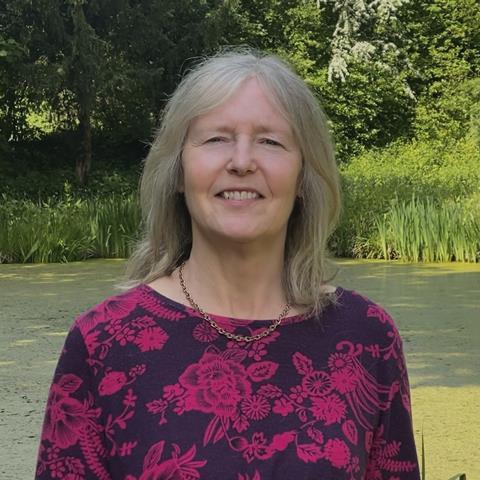Elizabeth Mackenzie BA(Hons) ACIB DipPFS spoke with Jemimah Wright about how she became an independent financial advisor and the advice she has for us during the cost of living crisis

How did you come to be a financial planner?
In the 1980s I spent a year as a language assistant as part of my degree. The previous incumbent had become a Christian while in France and prayed for me. After my degree I joined TSB bank for six years, and there I met two managers who were lovely Christians. I am convinced they prayed for me, too. During this time I decided to follow Christ. Soon afterwards I accepted, with trepidation, an invitation from an independent financial adviser (IFA) to speak at a money management course about developing a good relationship with your bank manager and how to successfully apply for lending. I was subsequently offered a role as an adviser in his firm and I have never looked back. My career has been a fabulous adventure.
How has God helped you in your role?
Becoming an IFA was quite a change. My role became much like that of a GP, diagnosing the financial need and advising a solution: for example, setting up life cover in trust, or recommending the client set up lasting powers of attorney. While I worked for the bank I enjoyed a subsidised mortgage and a salary. These ceased when I became an IFA, so God found me a suitable lodger while I got established. He brings me lovely clients, many of them Christians. He is showing me the benefits of obedience to his many teachings about money and business, which I share with my clients. It seems sometimes that the Financial Conduct Authority (FCA), our industry regulator, is only just catching up with God’s word. For example, ethical or sustainable investment is a hot topic now, but for decades I have been raising the subject with new clients at our first meeting. God has protected me from any successful claim against me by ensuring that I give suitable and compliant advice. He has given me words of knowledge and of wisdom that have directly spoken into the situations that clients face.
Why do you think financial planning is important?
God talks about money in approximately 2,350 verses of the Bible! That is more than you will find for almost any other topic. Alongside time and energy, money is a vital enabler of every other aspect of a godly and fruitful life. All three of these are to be stewarded well. As Psalm 24:1 says: “The earth is the Lord’s and everything in it, the world and all who live in it.” God also encourages planning: “The plans of the diligent lead to profit as surely as haste leads to poverty” (Proverbs 21:5).
We read verses like Luke 6:38 – “Give, and it will be given to you” and 1 John 3:17: “If anyone has material possessions and sees a brother or sister in need but has no pity on them, how can the love of God be in that person?” How do you balance those with saving wisely? How can we stay generous and also be wise?
God is showing me the benefits of obedience to his many teachings about money and business, which I share with my clients
I believe God calls us to give unconditionally through regular tithing of income, and to give in addition to that as he tells us to individually. We trust God, but we do not leave our car on the street all night unlocked. It is wise to ensure that, if we meet difficult times, our needs and those of our dependents will be met and we will not be a burden to others. For these purposes I recommend setting up protection policies such as income protection, critical illness cover and life cover. We can then start to build resources that will enable us to respond quickly and generously to God’s promptings to contribute. I would suggest that when we perceive a need, this is first and foremost a call to prayer to consider the situation from God’s perspective, rather than us jumping in to solve the issue and possibly missing his best solution.
Our world systems are based on debt (mortgages etc) but the Bible tells us that we should be lenders not borrowers – what is your response to that?
Proverbs 22:7 tells us that when we borrow, we become a servant to the lender, so it is important to consider taking on debt very carefully. However, Mark Lloydbottom in his devotional Blueprint unpacks biblical wisdom and suggests that borrowing might be considered in the following circumstances: 1. The item purchased is an asset with the potential to appreciate or produce income; 2. The value of an item equals or exceeds the amount owed against it; 3. The debt is not so high that repayment puts undue strain on your budget; 4. The debt does not give rise to anxiety. To give an example, student loans are often essential these days for anyone wanting to get a degree. They do have ill effects in that they normalise debt and can easily encourage young people to take out other, more expensive loans. However, they are tied to income, so repayments are only due once the client’s income reaches a certain level and can be considered rather as an extra tax. If debt has become a problem, please do not ignore it. Tell somebody. Just doing this will alleviate some of the anxiety. A superb organisation you may want to approach is Christians Against Poverty (capuk.org). They have an excellent reputation for bringing about a positive resolution for their clients.
How can we maximise our income in the cost-of-living crisis?
Most people cannot increase their income except by taking on more work, which may not be possible or desirable. I would view this from another angle: How can we make the most of our income? Good stewardship applies regardless of one’s resources. Here’s some ideas for your consideration. Check your tax code on your pay slip. Make sure you are claiming any allowances you are entitled to. Consider each of your commitments and whether they are still needed, wanted or the right solution for you. Set a budget and, just as important, review your progress in living within it. Keep credit cards for major purchases where you have the funds already saved so you can pay the bill in full at the end of the month and avoid paying relatively high interest. Using a credit card also affords you some useful consumer protection. You will find that spending cash is far harder (especially these days) than simply tapping with a card or a phone. Take time to contemplate a major purchase, do not act quickly even if you are being pressurised to proceed. There will always be another sale and God may have a more cost-effective way to meet your need!
Three top financial tips for women
1. Start planning as early as possible
A woman in her 20s may feel she has no need or no money for financial planning, but even a little saved now will add up. It takes a working lifetime to save up for an adequate income in retirement, so everyone should start putting money into a pension as soon as they are earning. To save enough for a deposit on a house may take a long time, so the sooner you start, the better. Our biggest financial priorities should be put in place first. I would also strongly recommend taking out protection, so that these aspirations remain achievable no matter what. Clients who are young and healthy often see no need for protection, but this is when it is cheapest to take out such plans. Once the key priorities are in place, lesser objectives can be added – such as a special holiday or investment in personal development. All that said, if you are now in your 50s or 60s but have never done any financial planning, start now as it’s never too late.
2. Hold regular reviews
Regularly check your progress towards your financial planning objectives and consider whether any of your circumstances have changed and if your planning needs to be adjusted accordingly. If you have a mortgage, how is it to be paid off? Do you plan to review it when the initial offer ends? If you are married, have you both taken out life cover that will pay off the mortgage if one of you should die? If you haven’t taken out income protection or critical illness cover for reasons of cost, could you afford these now? If you have children, have you taken out savings plans for them? If not, could you do this now? Are you paying enough into a pension? Have you saved enough for retirement? You can continue paying into a pension until you are 75 and can receive tax relief. Can you afford to retire early? You may want to help your children with a deposit on a house or set up savings accounts for grandchildren. If you have money that you would like to pass on to your descendants, what is the best way of doing this?
3. Ask a lot of questions
Whether you are single or married, take advice from your family, friends and pastoral leaders, but test their opinions with a financial adviser. You should also ask your financial adviser questions if there is anything you don’t understand.
If you are married and your spouse tends to manage the finances, please make sure that you understand what your financial situation is, what financial products you hold and how they meet your needs. This will ensure transparency and accountability in your household and will help if you unfortunately find yourself having to assume this responsibility for any reason.
Help with debt, money management and giving
christianfinancialadvisers.org.uk/find-christian-financial-adviser
citizensadvice.org.uk/debt-and-money/help-with-debt/

Elizabeth Mackenzie is an Independent Financial Advisor at Grange Financial Planning Ltd

































No comments yet